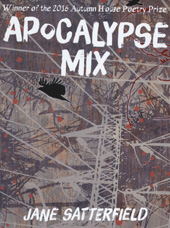 In February, Autumn House Press is scheduled to release the 2016 winners of their annual Autumn House Press Contests in Fiction, Nonfiction, and Poetry.
In February, Autumn House Press is scheduled to release the 2016 winners of their annual Autumn House Press Contests in Fiction, Nonfiction, and Poetry.
Nonfiction winner, Run Scream Unbury Save by Katherine McCord, offers brief meditations on family, language, art, and the act of writing.
In fiction, Heavy Metal by Andrew Bourelle took home the prize. This is Bourelle’s first novel and is set to the soundtrack of Metallica, Def Leppard, and Iron Maiden. Readers are pulled into the struggle of Danny, an adolescent dealing with extreme tragedy and the everyday conflicts of high school.
And in poetry, Jane Satterfield won with her debut collection Apocalypse Mix, which was selected by David St. John. Of his pick, St. John says, “these poems balance their raw psychological undercurrents with a calm and masterful stylistic authority.” The collection weaves the reader “into its fabric of individual and historical circumstances, as well within the dense foliation of personal experience.”
Check out the Autumn House Press website for more information about these titles, or stop by the contest page where submissions are now open.
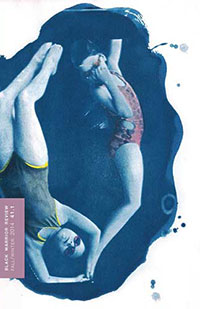 Issue 43.2 (Spring/Summer 2017) of BWR features winners of their 2016 Contest:
Issue 43.2 (Spring/Summer 2017) of BWR features winners of their 2016 Contest:
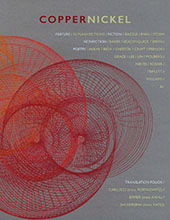 Editor Wayne Miller has announced several changes to Copper Nickel with its recent re-launch, including paying contributors: “starting with issue 24, we’ll be paying $30 per printed page. (We wish it could be more!)” Indeed, it is more than nothing, which is a great step for any literary publication to be able to take. Additionally, issue 24 of Copper Nickel includes a flash fiction portfolio featuring 22 works selected by Fiction Editors Teague Bohlen and Joanna Luloff. Cover image: “Tape Loops” by Eleanor King.
Editor Wayne Miller has announced several changes to Copper Nickel with its recent re-launch, including paying contributors: “starting with issue 24, we’ll be paying $30 per printed page. (We wish it could be more!)” Indeed, it is more than nothing, which is a great step for any literary publication to be able to take. Additionally, issue 24 of Copper Nickel includes a flash fiction portfolio featuring 22 works selected by Fiction Editors Teague Bohlen and Joanna Luloff. Cover image: “Tape Loops” by Eleanor King.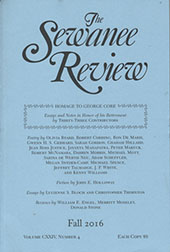 “This iteration of the Sewanee Review [Winter 2017], designed by Peter Mendelsund and Oliver Munday, signifies the first substantial redesign this magazine has undergone since Allen Tate’s commissioning of legendary printer P.J. Conkwright in autumn, 1944,” writes Managing Editor Robert Walker. He thanks the designers “for their beautiful, idiosyncratic vision, which so seamlessly incorporates the old into the new.” NewPages agrees.
“This iteration of the Sewanee Review [Winter 2017], designed by Peter Mendelsund and Oliver Munday, signifies the first substantial redesign this magazine has undergone since Allen Tate’s commissioning of legendary printer P.J. Conkwright in autumn, 1944,” writes Managing Editor Robert Walker. He thanks the designers “for their beautiful, idiosyncratic vision, which so seamlessly incorporates the old into the new.” NewPages agrees.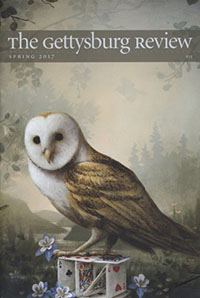 The Gettysburg Review Spring 2017 whimsical cover is a detail of “The Young Owl” by Kevin Sloan.
The Gettysburg Review Spring 2017 whimsical cover is a detail of “The Young Owl” by Kevin Sloan.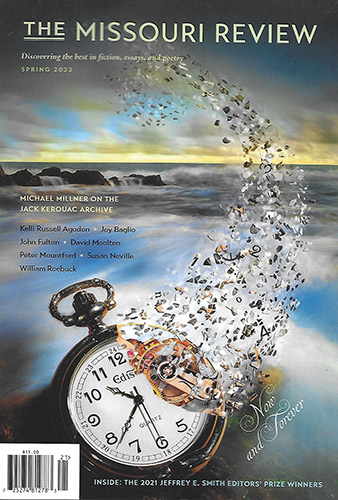 “Stress Test” by Eugenia Loli is the eye-catching cover art on The Missouri Review v39 n4 (2016)
“Stress Test” by Eugenia Loli is the eye-catching cover art on The Missouri Review v39 n4 (2016) Winner
Winner 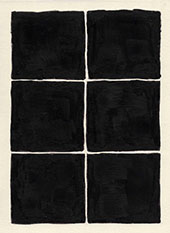 “It bears acknowledging that Drunken Boat 24 arrives in the wake of a substantial loss,” opens Nick Potter’s editorial to the comics section of the newest issue. “Amid the varied responses,” he writes, “I’ve noticed a subset of my friends on Facebook who have updated their profile pictures to a black square. In our increasingly globalized, increasingly visual culture, this act seems intuitive, marking absence, marking erasure, marking the digital equivalence of donning black in mourning, marking a kind of death. In comics, the filled-black panel has often been used as contextual shorthand for death—a kind of visual euphemism in the structural language of the form.”
“It bears acknowledging that Drunken Boat 24 arrives in the wake of a substantial loss,” opens Nick Potter’s editorial to the comics section of the newest issue. “Amid the varied responses,” he writes, “I’ve noticed a subset of my friends on Facebook who have updated their profile pictures to a black square. In our increasingly globalized, increasingly visual culture, this act seems intuitive, marking absence, marking erasure, marking the digital equivalence of donning black in mourning, marking a kind of death. In comics, the filled-black panel has often been used as contextual shorthand for death—a kind of visual euphemism in the structural language of the form.”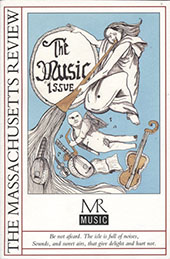 Executive Editor Jim Hicks opens the newest issue of The Massachusetts Review: The Music Issue with this from his introduction: “For this particular quarterly, given that ‘public affairs’ is the kicker to our moniker, the first reaction of readers might well be, ‘Why?’ Certainly if you think of music as entertainment, as remedy or therapy, you might not see such a theme as urgent. And yet what social movement, what new political formation, hasn’t had its unforgettable soundtrack? Where, after all, do those in the struggle find the force and inspiration to keep moving forward, to get up, stand up, in this world full of tunnels and only occasional light? What brings them together, what lifts their voices, what beats the drum?”
Executive Editor Jim Hicks opens the newest issue of The Massachusetts Review: The Music Issue with this from his introduction: “For this particular quarterly, given that ‘public affairs’ is the kicker to our moniker, the first reaction of readers might well be, ‘Why?’ Certainly if you think of music as entertainment, as remedy or therapy, you might not see such a theme as urgent. And yet what social movement, what new political formation, hasn’t had its unforgettable soundtrack? Where, after all, do those in the struggle find the force and inspiration to keep moving forward, to get up, stand up, in this world full of tunnels and only occasional light? What brings them together, what lifts their voices, what beats the drum?”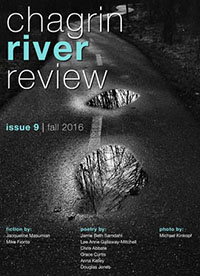 Chagrin River Review online journal of fiction and poetry is edited by faculty at Lakeland Community College, outside of Cleveland, Ohio. The cover photo for their December 2016 issue, with its unique road reflections, is by Michael Kinkopf.
Chagrin River Review online journal of fiction and poetry is edited by faculty at Lakeland Community College, outside of Cleveland, Ohio. The cover photo for their December 2016 issue, with its unique road reflections, is by Michael Kinkopf.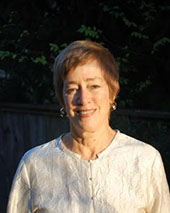 First Place Winner
First Place Winner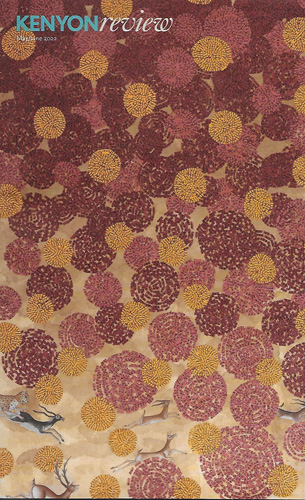 The 2016 Kenyon Review Short Fiction Contest as selected by final judge Jaimy Gordon are featured in the January/February 2017 issue of Kenyon Review. Included with an introduction by Associate Editor Kirsten Reach are First Prize Winner “Butter” by Eve Gleichman and Runners Up “Dance of the Old Century” by Dan Reiter and “The Babymoon” by Adam Soto. Information about the 2017 prize and a list of winners, including honorable mentions, can be read here, along with the full pieces as published in the print edition. Editor David H. Lynn comments on the history and philosophy behind this contest in his Editor’s Note: What Place Literary Contests?
The 2016 Kenyon Review Short Fiction Contest as selected by final judge Jaimy Gordon are featured in the January/February 2017 issue of Kenyon Review. Included with an introduction by Associate Editor Kirsten Reach are First Prize Winner “Butter” by Eve Gleichman and Runners Up “Dance of the Old Century” by Dan Reiter and “The Babymoon” by Adam Soto. Information about the 2017 prize and a list of winners, including honorable mentions, can be read here, along with the full pieces as published in the print edition. Editor David H. Lynn comments on the history and philosophy behind this contest in his Editor’s Note: What Place Literary Contests? Brevity: A Journal of Concise Literary Nonfiction January 2017 features three new craft essays: “The Essay and the Art of Equivocation” in which Brandon R. Schrand [pictured] considers our ability to equivocate artfully in the essay; “Truth & Delight: Resisting the Seduction of Surfaces” in which Peter Selgin examines the need to resist total seduction by sounds and surfaces; and “Beyond ‘Craft for Craft’s Sake’: Nonfiction and Social Justice” with Rachel Tolliver and M. Sausun discussing nonfiction and social justice in the new political era. Brevity’s full content can be read online.
Brevity: A Journal of Concise Literary Nonfiction January 2017 features three new craft essays: “The Essay and the Art of Equivocation” in which Brandon R. Schrand [pictured] considers our ability to equivocate artfully in the essay; “Truth & Delight: Resisting the Seduction of Surfaces” in which Peter Selgin examines the need to resist total seduction by sounds and surfaces; and “Beyond ‘Craft for Craft’s Sake’: Nonfiction and Social Justice” with Rachel Tolliver and M. Sausun discussing nonfiction and social justice in the new political era. Brevity’s full content can be read online.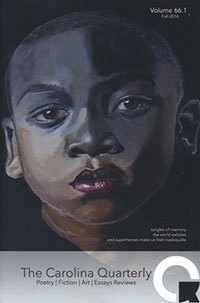 Aimee Bungard is the featured artist in the Winter 2017 issue of The Carolina Quarterly, with “Eyeris” on the cover and a portfolio of her work inside, in a style which she describes as “ecological expressionist.”
Aimee Bungard is the featured artist in the Winter 2017 issue of The Carolina Quarterly, with “Eyeris” on the cover and a portfolio of her work inside, in a style which she describes as “ecological expressionist.”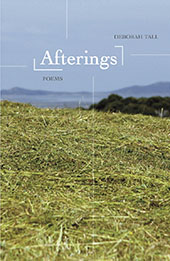 The fall 2016 issue of Seneca Review is a book of poems, Deborah Tall’s final collection, Afterings. “It is a remarkable volume by a poet and nonfiction writer at the peak of her powers. Eavan Boland has called it ‘an essential collection,’ and Mary Ruefle says the poems have ‘not what is to be expected – hints of cessation – but an overwhelming sense of blossoming.'” Deborah Tall edited Seneca Review for twenty-five years, until 2006. This winter, Seneca Review will include a copy of Deborah Tall’s final book of nonfiction, A Family of Strangers, with any new subscription to the journal.
The fall 2016 issue of Seneca Review is a book of poems, Deborah Tall’s final collection, Afterings. “It is a remarkable volume by a poet and nonfiction writer at the peak of her powers. Eavan Boland has called it ‘an essential collection,’ and Mary Ruefle says the poems have ‘not what is to be expected – hints of cessation – but an overwhelming sense of blossoming.'” Deborah Tall edited Seneca Review for twenty-five years, until 2006. This winter, Seneca Review will include a copy of Deborah Tall’s final book of nonfiction, A Family of Strangers, with any new subscription to the journal.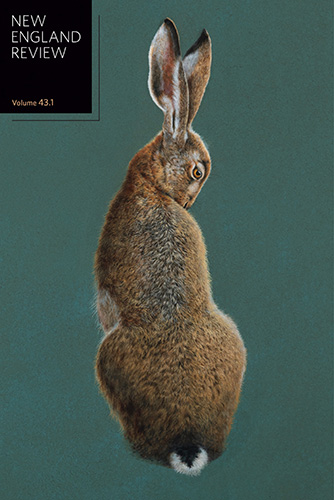 In its regular “Rediscoveries” section, the newest issue of Middlebury’s New England Review (v37 n4) features “Two City Sketches” by Charles Dickens. Editor at Large Stephen Donadio provides an introduction, noting that after the serial publication of The Pickwick Papers, “there was indeed popular demand for a second selection of sketches. . . The complete collection of some fifty-six pieces came out in 1839, by which time Dickens’s commanding presence on the scene had been securely established. In that 1839 volume, the pieces are grouped in four categories: ‘Seven Sketches from Our Parish,’ ‘Scenes,’ ‘Characters,’ and ‘Tales.’ The two city sketches presented here are the first two included under ‘Scenes’; they are taken from the illustrated Sketches by Boz in the Standard Library Edition of Dickens’s Complete Writings published in thirty-two volumes by Houghton Mifflin & Company (Boston and New York) in 1894.” NER treats readers to several selections from its current print issue to read online, including these sketches by Dickens.
In its regular “Rediscoveries” section, the newest issue of Middlebury’s New England Review (v37 n4) features “Two City Sketches” by Charles Dickens. Editor at Large Stephen Donadio provides an introduction, noting that after the serial publication of The Pickwick Papers, “there was indeed popular demand for a second selection of sketches. . . The complete collection of some fifty-six pieces came out in 1839, by which time Dickens’s commanding presence on the scene had been securely established. In that 1839 volume, the pieces are grouped in four categories: ‘Seven Sketches from Our Parish,’ ‘Scenes,’ ‘Characters,’ and ‘Tales.’ The two city sketches presented here are the first two included under ‘Scenes’; they are taken from the illustrated Sketches by Boz in the Standard Library Edition of Dickens’s Complete Writings published in thirty-two volumes by Houghton Mifflin & Company (Boston and New York) in 1894.” NER treats readers to several selections from its current print issue to read online, including these sketches by Dickens.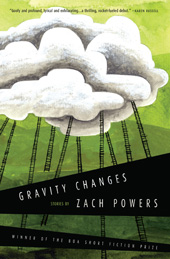 BOA Editions has announced spring publications of the winners of the Isabella Gardner Poetry Award, the BOA Short Fiction Prize, and the A. Poulin Jr. Poetry Prize.
BOA Editions has announced spring publications of the winners of the Isabella Gardner Poetry Award, the BOA Short Fiction Prize, and the A. Poulin Jr. Poetry Prize. Lynn Easton’s “The Equation,” winner of the 2016 Contance Rooke Creative Nonfiction Prize as selected by final judge Lee Maracle, is featured in the Winter 2016 issue of The Malahat Review. A conversation with Canadian editor and poet, Kate Kennedy and prize winner Lynn Easton (pictured) can be read on the Malahat website here. A full list of finalists can be read here.
Lynn Easton’s “The Equation,” winner of the 2016 Contance Rooke Creative Nonfiction Prize as selected by final judge Lee Maracle, is featured in the Winter 2016 issue of The Malahat Review. A conversation with Canadian editor and poet, Kate Kennedy and prize winner Lynn Easton (pictured) can be read on the Malahat website here. A full list of finalists can be read here.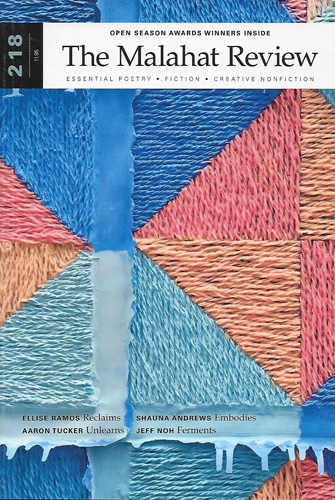 Lawrence Paul Yuxweluptun ‘s “Christy Clark and the Kinder Morgan Go-Go Girls” draws readers to the Winter 2016 cover of The Malahat Review, with guest editors Philip Kevin Paul (poetry), Richard Van Camp (fiction), Leanne Betasamosake Simpson (CNF) making selections for the theme “Indigenous Perspectives.”
Lawrence Paul Yuxweluptun ‘s “Christy Clark and the Kinder Morgan Go-Go Girls” draws readers to the Winter 2016 cover of The Malahat Review, with guest editors Philip Kevin Paul (poetry), Richard Van Camp (fiction), Leanne Betasamosake Simpson (CNF) making selections for the theme “Indigenous Perspectives.”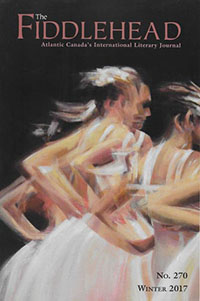 I was mesmerized by Ann Manuel’s “Blur I” on the Winter 2017 cover of The Fiddlehead, Atlantic Canada’s International Literary Journal.
I was mesmerized by Ann Manuel’s “Blur I” on the Winter 2017 cover of The Fiddlehead, Atlantic Canada’s International Literary Journal.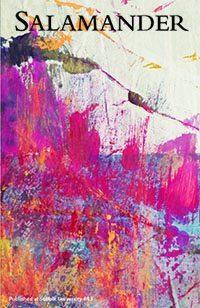 And just one more splash of color to brighten a winter’s day: “Gouache on Newspaper” by Elizabeth Doran on the cover of Suffolk University’s Salamander #43.
And just one more splash of color to brighten a winter’s day: “Gouache on Newspaper” by Elizabeth Doran on the cover of Suffolk University’s Salamander #43.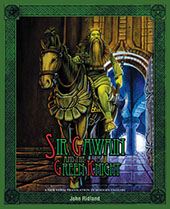 Able Muse Press publishes poetry and short story collections, and novels from emerging and established authors. Though not exclusively, their focus has been primarily formal poetry. They have just announced the launch of the imprint Word Galaxy Press, which Editor Alexander Pepple says “will be somewhat more inclusive, relative to Able Muse Press, toward poetic styles, and will lean especially toward fiction. Pictured: Sir Gawain and the Green Knight – a new Modern English translation by John Ridland.
Able Muse Press publishes poetry and short story collections, and novels from emerging and established authors. Though not exclusively, their focus has been primarily formal poetry. They have just announced the launch of the imprint Word Galaxy Press, which Editor Alexander Pepple says “will be somewhat more inclusive, relative to Able Muse Press, toward poetic styles, and will lean especially toward fiction. Pictured: Sir Gawain and the Green Knight – a new Modern English translation by John Ridland.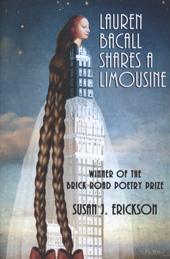 With the annual Brick Road Poetry Contest, Brick Road Poetry Press seeks a collection that fits their mission of publishing poetry that entertains, amuses, and edifies.
With the annual Brick Road Poetry Contest, Brick Road Poetry Press seeks a collection that fits their mission of publishing poetry that entertains, amuses, and edifies.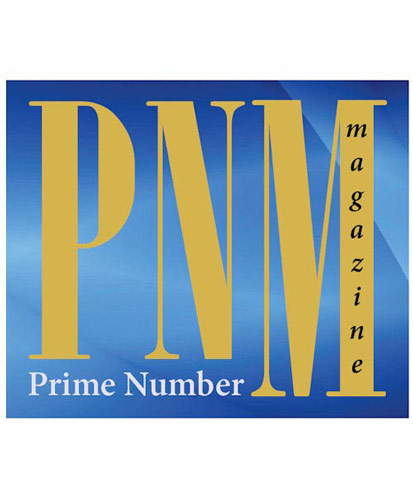 Prime Number Magazine runs a free monthly contest for writers to flex their skill at length limits. Published by Press 53, Prime Number holds entries to 53 words and a monthly prompt. Winners are published on the Prime Number website and receive a free book from Press 53. For December, the prompt was to write a 53-word story about ‘chill,’ and the winner was “The Last” by Greg Hill. New judges are named for each month’s contest, and winning authors also get to submit a 53-word bio. The prompt for January is to “write a story about a penny” with the deadline being the final day of the month. Winning stories appear within a week of the contest end. Click here more information about the contest.
Prime Number Magazine runs a free monthly contest for writers to flex their skill at length limits. Published by Press 53, Prime Number holds entries to 53 words and a monthly prompt. Winners are published on the Prime Number website and receive a free book from Press 53. For December, the prompt was to write a 53-word story about ‘chill,’ and the winner was “The Last” by Greg Hill. New judges are named for each month’s contest, and winning authors also get to submit a 53-word bio. The prompt for January is to “write a story about a penny” with the deadline being the final day of the month. Winning stories appear within a week of the contest end. Click here more information about the contest. In February, Autumn House Press is scheduled to release the 2016 winners of their annual Autumn House Press Contests in Fiction, Nonfiction, and Poetry.
In February, Autumn House Press is scheduled to release the 2016 winners of their annual Autumn House Press Contests in Fiction, Nonfiction, and Poetry.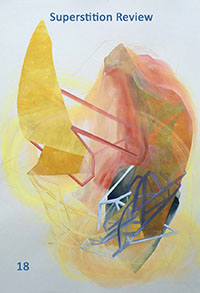 “My Beating Heart” by Rossitza Todorova welcomes readers to Superstition Review‘s issue 18, a fully accessible online literary magazine produced by creative writing and web design students at Arizona State University.
“My Beating Heart” by Rossitza Todorova welcomes readers to Superstition Review‘s issue 18, a fully accessible online literary magazine produced by creative writing and web design students at Arizona State University.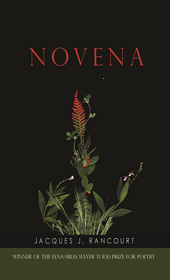 Next month, readers can look forward to the publication of Novena by Jacques J. Rancourt, winner of the Lena-Miles Wever Todd Prize for Poetry. The poems are formed after the novena, a nine-day Catholic prayer seeking intercession from the Virgin Mary (recast as a drag queen in this collection). Rancourt invites “prayer not to symbols of dogmatic perfection but to those who are outcast or maligned, LGBTQ people, people in prison, people who resist, people who suffer and whose suffering has not been redeemed.”
Next month, readers can look forward to the publication of Novena by Jacques J. Rancourt, winner of the Lena-Miles Wever Todd Prize for Poetry. The poems are formed after the novena, a nine-day Catholic prayer seeking intercession from the Virgin Mary (recast as a drag queen in this collection). Rancourt invites “prayer not to symbols of dogmatic perfection but to those who are outcast or maligned, LGBTQ people, people in prison, people who resist, people who suffer and whose suffering has not been redeemed.”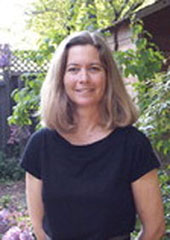 Able Muse Write Prize for Fiction
Able Muse Write Prize for Fiction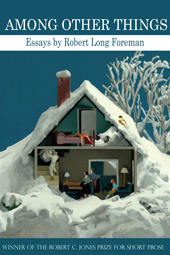 Pleaides Press annually holds the Robert C. Jones Short Prose Book Contest in honor of Robert C. Jones, a former professor of English at the University of Missouri.
Pleaides Press annually holds the Robert C. Jones Short Prose Book Contest in honor of Robert C. Jones, a former professor of English at the University of Missouri.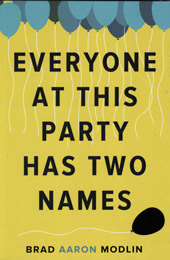 During the tail end of 2016, Southeast Missouri State University Press released the winner of the 2015 Cowles Poetry Book Prize: Everyone at This Party Has Two Names by Brad Aaron Modlin. Advance praise dubs the collection “Poignant, quirky, troubled” (Larissa Szporluk), “[a]n impressive debut from a poet who is as interesting as he is unpredictable” (J. Allyn Rosser). While this is Modlin’s first collection, his poetry, fiction, and nonfiction have appeared in Denver Quarterly, The Florida Review, Indiana Review, and DIAGRAM, among others.
During the tail end of 2016, Southeast Missouri State University Press released the winner of the 2015 Cowles Poetry Book Prize: Everyone at This Party Has Two Names by Brad Aaron Modlin. Advance praise dubs the collection “Poignant, quirky, troubled” (Larissa Szporluk), “[a]n impressive debut from a poet who is as interesting as he is unpredictable” (J. Allyn Rosser). While this is Modlin’s first collection, his poetry, fiction, and nonfiction have appeared in Denver Quarterly, The Florida Review, Indiana Review, and DIAGRAM, among others. Editor Nathaniel Perry [pictured] of The Hampden-Sydney Poetry Review considers in the Winter 2016 Editor’s Note “that poetry is both a serious lifeblood and something seriously fun.” And further questions, “. . .how many poets are still willing to admint that it’s the fun of poetry that maybe primarily attracts us to the art? . . . why must we always take ourselves so seriously? What’s wrong with an occaion for poetry?” And so, Perry set out to creat both the occasion and the invitation to have fun. “I thought if an issue of the magazine could empahsize the fun of the moment, the pleasure in working out draft – it might be a tonic kind of enterprise and, who knows, soemtimes something bigger happens anyhow. In that spirit, this year’s issue was commissioned specifically for the magazine. Writers, both solicited and unsolicited, were told they could write on one of five themes – A Walk, Silence, Water, Frames and Containers. Each poet only had an hour to compose a poem . . . and ‘sonnet,’ formally, could be in interpreted in whatever way was useful to the writer.”
Editor Nathaniel Perry [pictured] of The Hampden-Sydney Poetry Review considers in the Winter 2016 Editor’s Note “that poetry is both a serious lifeblood and something seriously fun.” And further questions, “. . .how many poets are still willing to admint that it’s the fun of poetry that maybe primarily attracts us to the art? . . . why must we always take ourselves so seriously? What’s wrong with an occaion for poetry?” And so, Perry set out to creat both the occasion and the invitation to have fun. “I thought if an issue of the magazine could empahsize the fun of the moment, the pleasure in working out draft – it might be a tonic kind of enterprise and, who knows, soemtimes something bigger happens anyhow. In that spirit, this year’s issue was commissioned specifically for the magazine. Writers, both solicited and unsolicited, were told they could write on one of five themes – A Walk, Silence, Water, Frames and Containers. Each poet only had an hour to compose a poem . . . and ‘sonnet,’ formally, could be in interpreted in whatever way was useful to the writer.”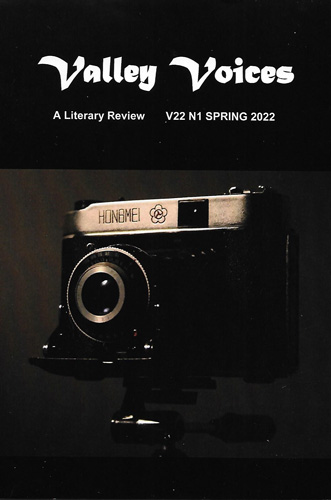 It may not seem that far a stretch for a literary journal published at Mississippi Valley State College to theme an issue on the Mississippi Delta, but indeed, since its inauguration in 2000, Valley Voices has been a publication renown for presenting a global perspective of thought and voice. Past issues have focused on New York School and Diaspora, Michael Anania, Perspectives on African American Literature, Poetic Translation in a Global Context, and issues on southern writers. So, indeed, it is a ‘special issue’ of Valley Voices when the content is fully dedicated to the Mississippi Delta. Editor John Zheng writes in his introduction to issue 16.2, “The Mississippi Delta isn’t a region where tourists can easily seek out natural beauty as they do in Yellowstone or in the Smoky Mountains; its beauty remains to be discovered with a little exploration. . . . We run this special issue for literary or artistic expression, for doumenting the region, for people deeply rooted here or having moved elsewhere. It is hopeful that these voices, literary or visual, will tell interesting stories.” See a full list of the issue’s content here.
It may not seem that far a stretch for a literary journal published at Mississippi Valley State College to theme an issue on the Mississippi Delta, but indeed, since its inauguration in 2000, Valley Voices has been a publication renown for presenting a global perspective of thought and voice. Past issues have focused on New York School and Diaspora, Michael Anania, Perspectives on African American Literature, Poetic Translation in a Global Context, and issues on southern writers. So, indeed, it is a ‘special issue’ of Valley Voices when the content is fully dedicated to the Mississippi Delta. Editor John Zheng writes in his introduction to issue 16.2, “The Mississippi Delta isn’t a region where tourists can easily seek out natural beauty as they do in Yellowstone or in the Smoky Mountains; its beauty remains to be discovered with a little exploration. . . . We run this special issue for literary or artistic expression, for doumenting the region, for people deeply rooted here or having moved elsewhere. It is hopeful that these voices, literary or visual, will tell interesting stories.” See a full list of the issue’s content here.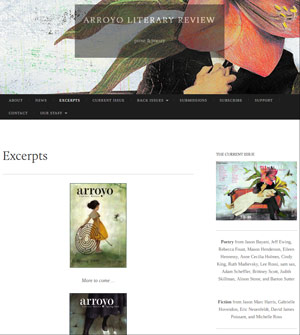 Arroyo Literary Review recently announced an exciting addition to their website. A new Excerpts page has arrived with selections from past issues now available as PDFs, and with more on the way. Read six pieces from the current Spring 2016 issue, or travel back in time a few years for Pushcart Prize nominees and other noteworthy work. Writers considering submitting to the magazine can now get an idea of what the editors are looking for without a physical copy. There’s a lot there to keep both readers and writers busy as more winter weather rolls in.
Arroyo Literary Review recently announced an exciting addition to their website. A new Excerpts page has arrived with selections from past issues now available as PDFs, and with more on the way. Read six pieces from the current Spring 2016 issue, or travel back in time a few years for Pushcart Prize nominees and other noteworthy work. Writers considering submitting to the magazine can now get an idea of what the editors are looking for without a physical copy. There’s a lot there to keep both readers and writers busy as more winter weather rolls in.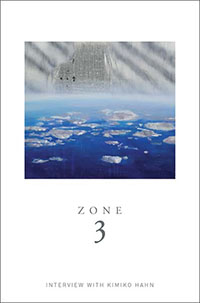 This week’s theme for covers seems to be ‘the fantastical from the literal.’ Philippe Pirrip‘s “Curved Plan” is featured on the cover of Zone 3 Fall 2016. Pripp describes his artistic approach as “a visual play of identities” and “a resistance to conform to literal figurations of what is and what has been depicted as being queer.”
This week’s theme for covers seems to be ‘the fantastical from the literal.’ Philippe Pirrip‘s “Curved Plan” is featured on the cover of Zone 3 Fall 2016. Pripp describes his artistic approach as “a visual play of identities” and “a resistance to conform to literal figurations of what is and what has been depicted as being queer.”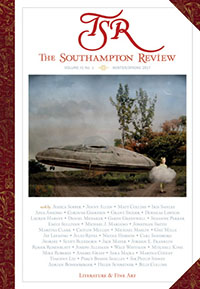 Of the cover of Winter/Spring 2017 The Southampton Revi Editor-in-Chief Lou Ann Walker comments: “Because this issue’s theme is the muse, all of the art in this issue was chosen for its emphasis on story and the fantastical places imagination can go. Take, for example, the cover, ‘Stopping by Woods,’ created by Corinne Geertsen. How did that ballerina in her tutu come to be juxtaposed with that extraterrestrial spaceship?” Indeed.
Of the cover of Winter/Spring 2017 The Southampton Revi Editor-in-Chief Lou Ann Walker comments: “Because this issue’s theme is the muse, all of the art in this issue was chosen for its emphasis on story and the fantastical places imagination can go. Take, for example, the cover, ‘Stopping by Woods,’ created by Corinne Geertsen. How did that ballerina in her tutu come to be juxtaposed with that extraterrestrial spaceship?” Indeed.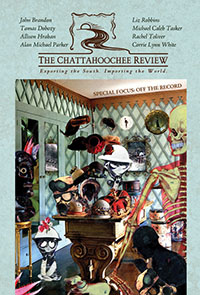 The Chattahoochee Review Fall2016/Winter2017 cover art “War Bonnets: Never Out of Style for Long” by Lucy Julia Hale is representative of her artistic approach, which she describes: “I am drawn to see deeply into paper artifacts / mass-produced photographic images of our interiors and exteriors – / where we have lived.”
The Chattahoochee Review Fall2016/Winter2017 cover art “War Bonnets: Never Out of Style for Long” by Lucy Julia Hale is representative of her artistic approach, which she describes: “I am drawn to see deeply into paper artifacts / mass-produced photographic images of our interiors and exteriors – / where we have lived.”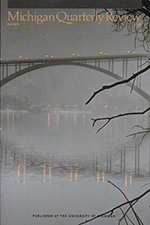 “Why our continuing attraction to Greece?” writes Keith Taylor in his introduction to the newest issue of Michigan Quarterly Review. “There is something in that small country out there on the edge of Europe that doesn’t feel like the rest of the continent. Part of the attraction is certainly to the very different modern history, and to a landscape shaped by human use yet still oddly wild. . . . And, at the risk of belaboring the obvious, we continue to be drawn to Greece by the weight and presence of the classical tradition. We have tried to expand our canon and assume the influence of other traditions, but whether we like it or not, Western ideas continue to reflect the ideas first thought on those dry hills.”
“Why our continuing attraction to Greece?” writes Keith Taylor in his introduction to the newest issue of Michigan Quarterly Review. “There is something in that small country out there on the edge of Europe that doesn’t feel like the rest of the continent. Part of the attraction is certainly to the very different modern history, and to a landscape shaped by human use yet still oddly wild. . . . And, at the risk of belaboring the obvious, we continue to be drawn to Greece by the weight and presence of the classical tradition. We have tried to expand our canon and assume the influence of other traditions, but whether we like it or not, Western ideas continue to reflect the ideas first thought on those dry hills.”